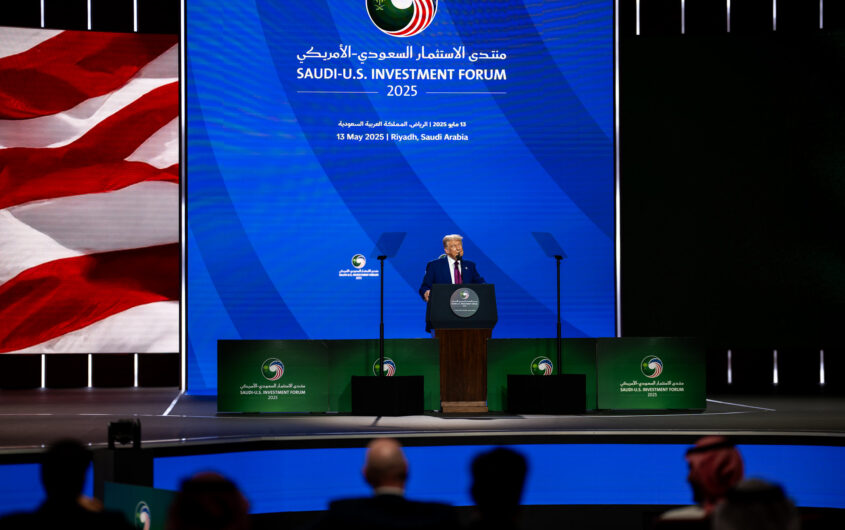
The White House via Flickr
Role Reversal

Stephen F. Szabo
Senior Fellow
Dr. Stephen F. Szabo is a Senior Fellow at AICGS, where he focuses on German foreign and security policies and the new German role in Europe and beyond. Until 2017, he was the Executive Director of the Transatlantic Academy, a Washington, DC, based forum for research and dialogue between scholars, policy experts, and authors from both sides of the Atlantic. Prior to joining the German Marshall Fund in 2007, Dr. Szabo was Interim Dean and Associate Dean for Academic Affairs and taught European Studies at The Paul H. Nitze School of Advanced International Studies, Johns Hopkins University. He served as Professor of National Security Affairs at the National War College, National Defense University (1982-1990). He received his PhD in Political Science from Georgetown University and has been a fellow with the Alexander von Humboldt Stiftung, the Woodrow Wilson International Center for Scholars, and the American Academy in Berlin, as well as serving as Research Director at AICGS. In addition to SAIS, he has taught at the Hertie School of Governance, Georgetown University, George Washington University, and the University of Virginia. He has published widely on European and German politics and foreign policies, including. The Successor Generation: International Perspectives of Postwar Europeans, The Diplomacy of German Unification, Parting Ways: The Crisis in the German-American Relationship, and Germany, Russia and the Rise of Geo-Economics.
The Trump Geoeconomic Approach Imitates Merkel
The first three months of the Trump administration have seen what could be called the Germanization of U.S. foreign policy. Trump has taken on many aspects of a geoeconomic approach to the world which characterized the Merkel years in Germany. Under Merkel’s chancellorship, Germany pursued a classic case of geoeconomics. This policy had the following key traits:
- a definition of national interests in economic terms,
- a shift from multilateralism to selective multilateralism,
- the predominant role of business and especially export-oriented businesses in the shaping of foreign policy,
- the elevation of economic interests over human rights, democracy promotion, and other non-economic interests, and
- the use of economic power to impose national preferences on others. [i]
American conservatives, including Trump himself, were critical of what they saw as German free riding with its low defense spending allowing it to focus on economic policies and relying on American strategic deterrence. This was a policy that had a weak human rights dimension, especially regarding relations with China and Russia. German policymakers justified cutting major economic deals while overlooking human rights abuses in both Russia and China, justified by an unconvincing mantra of “change through trade.” This is an old concept that even was employed by the Clinton administration, which contends that economic interdependence and exposure to the outside world will eventually democratize autocracies. The German expression, Wandel durch Handel, was more Handel and much less Wandel in practice. A German commentator even wrote of “the German love for dictators” who provided stability for economic relationships.[ii]
The Germans were advocates of what Joseph Nye termed soft power and relied very little on hard power. Economic power, however, is hard power and, just as its military twin, can be used coercively, especially through sanctions, something the Germans were reluctant to do as it undermined their reliability as a trading partner.
Trump’s anger toward and lack of respect for Merkel was widely known, so it is ironic that he seems to be taking on some of the aspects of her approach which resulted in over-dependence on Russian energy and Chinese markets and left Germany in a vulnerable position as American reliability has taken a drastic hit. The new German chancellor, Friedrich Merz, seems to have rediscovered hard power and in this respect resembles more the old American approach with its heavy reliance upon both economic and military power. Here, of course, the analogy weakens because the Trump administration has increased the defense budget. However, the reluctance of the president to use military power or get involved in military commitments is well-known as can be seen in the current debate within the administration over the nuclear deal with Iran and the president’s desire to avoid being dragged into a war by Netanyahu.
President Trump’s trip to the Middle East and the Gulf states very much resembled those of German leaders in the past which can be characterized as Wirtschaft Über Alles. It brought back memories of Angela Merkel leading delegations of German CEOs to China to cut deals with Beijing while downplaying or ignoring forced labor being done in German plants in China by Uighurs. Trump’s talk of future economic deals with Russia is reminiscent of the so-called Petersburg Dialogue of German and Russian business leaders, which clearly subordinated human rights and strategic concerns to side sessions. The Trump approach differs from that of the Germans in that he does not worry about change through trade and is openly mercantilist. Germany being a medium-sized and export-dependent power is much more reliant upon an effective multilateral system. In some regards the Trump approach reflects an older German approach what was once called Machtpolitik or power politics practiced in the nineteenth and early twentieth centuries.
While the analogy may be limited, it is still useful and ironic to see the convergence of the new American approach with that of the mercantilist views of Merkel. Mercantilism without strategic vision resulted in Germany’s current strategic vulnerability. The overreliance on military power has cost America and Americans dearly, and a strategic rebalancing is long overdue. However, there are real dangers and limits to mercantilism when it is linked to arrogance and undisguised self-interest. American power, especially its economic power, has benefited greatly from a functioning multilateral system and Nye’s soft power. It has resulted in over seven decades of bandwagoning on American power as opposed to balancing it.
[i] Stephen F Szabo, Germany Russia and the Rise of Geo-economics (London: Bloomsbury, 2015); and Robert D. Blackwill and Jennifer M. Harris, War by Other Means: Geoeconomics and Statecraft (Cambridge: Harvard Press, 2016).
[ii] See Stephen F Szabo, “No Change Through Trade,” Internationale Politik, August 6, 2020.








